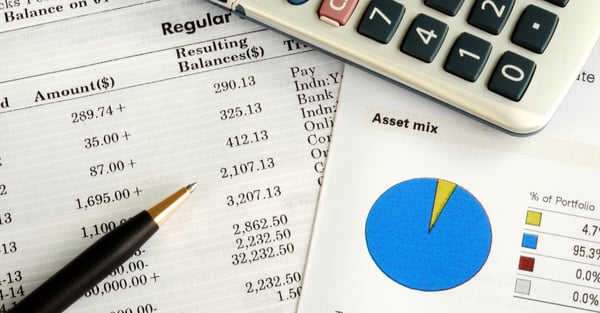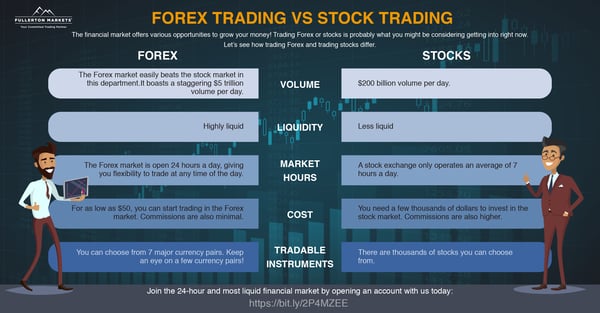$100 may not seem much, but it will go a long way when funnelled into the right financial vehicles. That's $100 more on your savings account or emergency fund if you deposit it.
You can also invest it in the stock market or ETF. If you set aside the same amount every month, you're going to achieve your goals for financial growth. The key is to know how to invest your money wisely, regardless of the amount.
If you prefer to trade, a $100 capital is more than enough. This is especially true in Forex where you can sign up for a micro account. At Fullerton Markets, the amount is enough for a minimum deposit to fund a new account.
Why investing early is best?
When you're young and healthy, investing is usually the last thing on your mind. When you're almost at retirement age, you would think there's no way any amount of investing would be of use to you.
What you may not know is that anyone can invest at any point in their life. When started early, however, there are more advantages to enjoy.
Because then, you'll have more time to grow your wealth and maybe more spunk to take on risks.
Moreover:
- You develop discipline and healthy behaviour towards money. You don't spend it needlessly or without thought.
- It improves your quality of life since you can afford to retire early. In times of crisis, you can keep stress under control as well.
- You're guaranteed an income when you retire.
But it's never too late to get started. There are different investment options at different ages.
Just to give you an overview:
- In your 30s, invest in more stocks and some bonds.
- In your 40s, focus on fixed investments and lower-risk bonds.
- In your 50s, be more aggressive with your investments (60% stocks, 40% bonds).
At any age, it is highly recommended that you investigate and invest in additional income streams.
You also need to prepare yourself to be a successful investor

Set a goal
Are you investing for the purpose of receiving an income, to grow your capital, or to achieve financial stability? The answer will dictate how you should go about investing.
Be in the right mindset
Your investments can gain or lose, depending on the market conditions. Can you stay focused and calm when things are not going the way you expected?
Understand what you're investing in
As Warren Buffett said, “Never invest in a business you cannot understand.” So do your homework and research. Get a mentor if needed.
Determine your investment strategy
This will depend on your behaviour towards investing. If you're a risk-taker, for example, you're likely to put your money into vehicles with higher returns but with equally high risks. If you prefer to preserve your wealth, then you choose low-risk investment products.
To diversify or not to diversify
Diversify, of course. With a wide range of investment options available to you, it's a crime to put all your money in one or just a few financial products.
Think long term
Most successful investors follow a long-term strategy and only enjoy returns after a decade or so. The perfect example of the idea that great things come to those who wait. It takes a strong mindset to pursue this course, however.
Have the will to keep learning
Don't just understand what you're investing in, keep discovering how to grow your wealth, rebalance your portfolio, and make the most of every investment opportunity.
How much to invest and where
The key to a good investment strategy at any age is the appropriate allocation of assets. There are numerous asset classes or categories in investing, with each one associated with different risk-and-reward levels.
Three main asset classes:
- Bonds (fixed-income securities)
- Cash and cash equivalents
- Stocks (equities)
Commodities, futures, real estate, and other derivatives make up other asset categories.
How much should you allocate to which asset at a certain age?
Since stocks and bonds are two of the most common investment vehicles, and are easier to gauge in terms of market performance, let's focus on these.
In a booming economy, investors are more confident and move more of their money into stocks. When the opposite happens, they prefer the safety of bonds.
The formula looks like this:
Booming economy = stocks are up, bonds are down
Failing economy = stocks are down, bonds are up
Let's assume your risk profile changes as you age.
Here's what your asset allocation may look like:
Age |
Risk profile |
Investing capacity |
Stocks |
Bonds |
| 20s | Aggressive | 10% (or less) | 80% to 90% | 10% to 20% |
| 30s | Can afford to take some risks | 10% to 15% | 70% to 80% | 20% to 30% |
| 40s | Smart about taking risks | 15% to 20% | 60% to 70% | 30% to 40% |
| 50s and 60s | Lower risk, with stability in mind | 20% or more | 50% to 60% | 40% to 50% |
| 70s and 80s | Low risk, focus on income | 20% or more | 30% to 50% | 50% to 70% |
There's nothing wrong with investing DIY. But because there are other asset classes to consider for diversification, it's highly recommended to consult with a trusted financial advisor.
Find one who can help determine your risk profile and guide you in developing the most suitable investment strategy for your needs, goals, and age.
Forex vs Stocks
Apart from the usual investment options, you can also make money trading foreign exchange. This refers to the process of buying one currency and selling another simultaneously, generally executed in currency pairs.
A good example is USD/JPY or the US Dollar and the Japanese Yen.
If you only have $100 to spare, a Forex investment is a great place to start. You only need that much for a minimum deposit.
But how does Forex compare with stocks?
Before anything else, some terminologies to get acquainted with:
Volume - refers to the size of the market
Liquidity - Refers to how easily and quickly an investment vehicle can be converted to cash
Market hours - The length of time you can trade or buy and sell
Cost - The amount needed to start investing

In addition, the focus on Forex is narrower because of the small number of tradable instruments. There are only seven major pairs that a trader needs to focus on and not thousands of stocks. These include EUR/USD Euro/US Dollar), GBP/USD (British Pound Sterling/US Dollar), USD/JPY (US Dollar/Japanese Yen), and USD/CHF (US Dollar/Swiss Franc).
Trading style: should you trade Forex or stocks?
Of course, whether you invest money in Forex or stocks, depends on your goals and the type of trader you are. Are you investing for the short term, medium term, or long term?
Short term
You're a short-term trader if you want to open and close trades within minutes or a short amount of time so you can maximise on small price movements.
You are better off trading Forex because:
- Trades can be made in minutes
- The cost of executing positions is inexpensive
- You only need a minimal amount to sustain margin requirements
Medium term
You're a medium-term trader if you're looking to hold positions for a day or more. You also initiate trades because of technical reasons.
In this case, you can trade both stocks and Forex.
Long term
You're a long-term trader if your investment decisions are based on fundamental variables that affect market movement. You also hold positions for months or years.
It is highly recommended that you trade stocks rather than Forex. The longer you hold the stocks the smoother the price movement becomes. For maximum returns, invest time in studying the intricacies of stock trading, including identifying your investing style and risk tolerance.
Forex investment options for those with little Forex knowledge/experience

Okay, you have your $100 and you want to dabble with Forex investment.
To the uninitiated, the world of currencies can be a confusing place. If you know the basics, however, you’ll find trading in Forex profitable.
How does Forex investment or trading works?
You trade currency pairs in various sized lots, with a micro lot at 1,000 units of a currency, a mini lot at 10,000 units, and a standard lot at 100,000 units.
If your account is in USD, then a micro lot is equivalent to $1,000.
Trading must be done in pairs, where you buy one currency and sell another at the same time. The change in value between two currencies is expressed as Pip, a unit of measurement used that is equivalent to 1/100 of 1%.
In Forex trading, you either buy Long or sell Short, depending on your speculation.
For example, you want to trade USD/JPY = 81.50.
If you speculate or expect that the price will rise to 81.50, you buy Long. If it's the opposite, you sell Short.
Still a bit confused?
There are two things you can do to learn how to invest in Forex without losing money.
- Trade with virtual money to build your confidence and boost your knowledge of the Forex market. Sign up for a demo account first. Once you get the hang of it, you can then move on to a Live account.
- Copy trade. This is where you copy positions that a trader opens and other individuals manage. This is done automatically once you link to a specific investor. With this strategy, a portion of your funds will be linked to a copied trader's account.
Therefore, when a trader makes a stock trade using 1% of their account balance, the same trade will be made using the same percentage from the funds you allocated to the trader you copied.
Check out Fullerton Markets' CopyPip System to better understand how copy trading works and the unique advantages you gain as a Forex investor.
Your $100 will go a long way
This is especially true if you spend it wisely and smartly. Where investing is concerned, success is achieved when you:
- Invest early, at a young age, or as soon as possible with your investment portfolio adjusted according to your goals.
- Ensure a balanced financial plan where you invest in the long term and sustain healthy cash flow.
- Invest only in what you understand to ensure big wins and avoid major losses.
- Create a cash flow plan and stick to it to protect yourself from a crisis that may impact your finances.
- Be objective, not emotional when investing so you can make better judgement and decisions.
- Say yes to investing and no to discretionary spending.
- Separate investments from cash reserves to stay liquid even when the market crashes.
- Invest in stocks, regardless of the risks, to build long-term growth and real wealth.
- Diversify across different asset classes to protect your finances from negative market movements.
- Recalibrate your portfolio the right way to maximise returns and preserve as much of your capital as possible.
Most importantly, never invest money you need or foresee using in the near future. For instance, don't invest money you plan to use to buy a property in five years. Your investment could drop by as much as 50%.
Ready to grow your wealth with the help of a recession-proof vehicle and invest in Forex, the world's largest financial market? No better place to start than right here with us! Begin trading with Fullerton Markets today by opening an account:
You might be interested in: How to Become a Seasoned Investor











